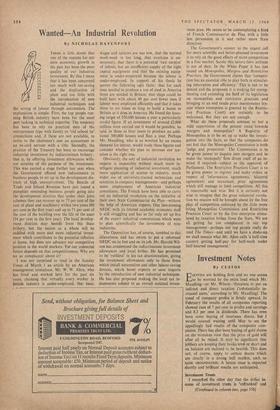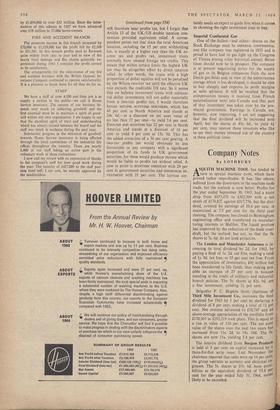Investment Notes
By CUSTOS
EQUITIES are holding firm and no one seems to be worried by the extra load which Mr. Maudling—or Mr. Wilson—threatens to• put on indirect and direct taxation ('substantially in- creased sums,' according to Mr. Maudling). The trend of company profits, is firmly upward. In February the results of all companies reporting showed rises of 7 per cent in profits and earnings and 8.3 per cent in dividends. There has even been some buying of insurance shares, but I would counsel waiting until May to see the appallingly bad results of the composite com- panies. There has also been buying of gold shares on the mistaken view that the price of gold will after all be raised. It may be significant that jobbers are keeping their books level or short and on balance are inclined to be bearish. This does not, of course, apply to certain shares which are clearly in a strong bull market, such as RANK ORGANISATION. A bonus issue Is expected shortly and brilliant results are anticipated.
Investment Trusts I remarked the other day that the dollar in- come of investment trusts is `unfranked' and (Continued in column two, page 356) (continued from page 354) will therefore bear profits tax, but I forgot that Article 13 of the UK/US double taxation con- vention provided equivalent relief. A corres- pondent points out that since the total American taxation, including the 15 per cent withholding tax, is usually at a higher rate than the UK in- come tax and profits tax, investment trusts normally have unused foreign tax credits. This means that within certain limits the highest UK tax may be altogether offset by direct taxation relief. In other words, the trusts with a high proportion of dollar equities will not be penalised by the Wilson two-tier tax until the effective UK rate exceeds the creditable US rate. So it seems that on balance investment trusts with substan- tial dollar investments will not suffer materially from a two-tier profits tax. I would therefore favour SECOND SCOTTISH NORTHERN, which has 45 per cent in North America and stands at 24s. 6d.—at a discount on net asset value of no less than 17 per cent—to yield 3.6 per cent. ENGLISH AND SCOTTISH has 22 per cent in North America and stands at a discount of 16 per cent to yield 4 per cent at 13s. 9d. This has the added attraction of a 36 per cent gearing. A two-tier profits tax would obviously be less favourable to any company with a significant proportion of its funds in UK government securities, for these would produce income which would be liable to profits tax without relief. A case in point is SCOTTISH AMERICAN with 24 per cent in government securities and EDINBURGH IN- VESTMENT with 21 per cent. The layman cer- tainly needs an expert to guide him when it comes to choosing the right investment trust to buy.
Imperial Continental Gas One of the dullest—and oldest—shares on the Stock Exchange must be IMPERIAL CONTINENTAL GAS (the company was registered in 1853 and is proud to have had its gas light up the Congress of Vienna among other historical scenes). Better times should now be in prospect. The company is at present negotiating terms for the supply of gas to its Belgian companies from the new Dutch gas fields and, in view of the subterranean storage which it has developed, it should be able to buy cheaply and improve its profit margins as sales advance. It will be recalled that the compensation money it received from French nationalisation went into Canada and that part of that investment was taken over by the pro- vincial government. Earnings in Canada are, however, now improving. I am not suggesting that the final dividend will be increased next April, but the shares at 43s. 6d., to yield 41 per cent, may interest those investors who like to see their money invested out of the country in these political times.



































 Previous page
Previous page